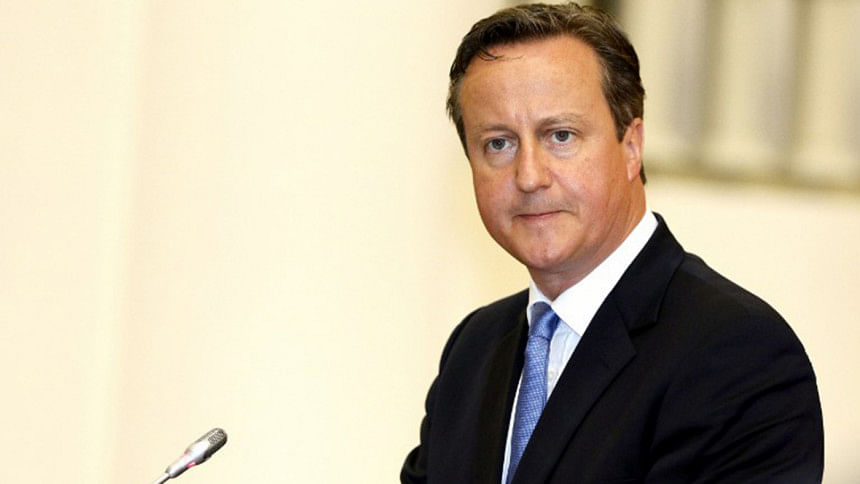UK to accept 'thousands' more refugees: Cameron

The UK is to provide resettlement to "thousands" more Syrian refugees in response to the worsening humanitarian crisis, David Cameron has announced.
He said the extra refugees would come from UN camps bordering Syria, and not from among people already in Europe.
Britain would act with its "head and heart", he said, as he pledged to find long-term solutions to the crisis.
No specific figure has been given but the UN refugee agency said the UK would take a further 4,000 Syrian refugees.
Earlier this week, the prime minister said accepting more people was not the simple answer to the situation, described by some as the worst humanitarian crisis since World War Two.
But speaking in Lisbon after talks with his Portuguese counterpart, Cameron said the UK had a "moral responsibility" to help those displaced by the four-year conflict in Syria, adding that more details would be set out next week following discussions with organisations working in the region.
'Deeply moved'
Calls for the UK to take in more refugees have intensified after the publication of a picture of the body of a drowned three-year-old Syrian boy, Alan Kurdi, washed up a Turkish beach.
Speaking to the BBC's Victoria Derbyshire programme, the boy's aunt, Tima Kurdi, said his and his brother's death should be "a wake-up call for the whole world".
Cameron has previously argued that the solution was not to take in more people but the government's approach to the crisis came under pressure from public and political figures, including:
Scottish First Minister Nicola Sturgeon has written to Cameron calling for the UK to accept more refugees and said Scotland would take in 1,000 "as a starting point"
Former Labour Home Secretary David Blunkett said the UK should take in 25,000 over the next six months while Bristol's mayor urged residents of the city to use their spare rooms to help
A petition calling on the UK to accept more refugees has got more than three times the 100,000 signatures needed for it to be eligible for a possible debate in Parliament.
Nearly 4,000 Syrians have been granted asylum in the last four years and the UK has accepted 216 Syrian refugees under a scheme to relocate the most vulnerable begun in early 2014.
Addressing reporters in Lisbon, Cameron said the £900m in British aid given to Syria, including food, aid and medical supplies, had stopped greater numbers from trying to reach Europe but said the UK would now go further in extending sanctuary to more refugees.
"Given the scale of the crisis and the suffering of the people, today I can announce that we will do more - providing resettlement for thousands more Syrian refugees.
"We will continue with our approach of taking them from refugee camps. This provides them with a more direct and safe route to the United Kingdom rather than risking the hazardous journey which has tragically cost so many of their lives," he said.
The PM added: "Britain will act with our head and our heart, providing refugee for those in need while working on long-term solutions to this crisis."
How will plan work?
Cameron's plan suggests he may expand the Syrian Vulnerable Persons Relocation (VPR) scheme - though the Home Office said details were not yet available.
Under VPR, 216 Syrians have been brought to the UK since March 2014. People arriving in the UK in need of protection usually have to apply for asylum - and if this is granted they get "refugee" status.
But people brought to Britain under VPR have not gone through this process. Instead, they have been granted Humanitarian Protection, a status normally used for people who "don't qualify for asylum" but would be at "real risk of suffering serious harm" in their home country.
Like people granted refugee status, those given Humanitarian Protection can stay for five years, after which they can apply to settle in the UK.
People in both categories have the right to work and access public funds.
Meanwhile, a stand-off between police and migrants on a train in Hungary is continuing into a second day.
On Thursday, police let the migrants board the train in Budapest but then tried to force them off at a refugee camp to the west of the capital.
Development charity Oxfam welcomed indications of a shift in policy, saying the UK should "show leadership in offering a haven to vulnerable refugees".
But UKIP leader Nigel Farage warned the European Union was sending a message that anybody who wants to can come to Europe which, he said, would compound the crisis.
"If we want to stop images like that picture of that three-year-old boy being taken out of the sea then we have to stop the boats from coming. That is absolutely vital," he told LBC radio.

 For all latest news, follow The Daily Star's Google News channel.
For all latest news, follow The Daily Star's Google News channel. 



Comments